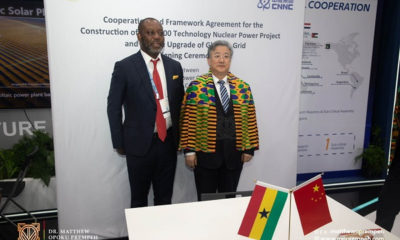GENERAL NEWS
How Singapore left Ghana behind to become a developed country

The story is often told about how Ghana has failed to live up to its full potential due to the many prospects the country had at the time of independence in 1957 and why its lack of proper progress is unfathomable.
Usually, the likes of Singapore and Malaysia are mentioned as ‘mates’ of Ghana at the time of independence in the late fifties and early sixties.
The two Asian countries, according to some, even looked up to Ghana in their early struggle to improve the lot of their citizens.
At the time of independence, both Ghana and Singapore had Income per Capita of around $500.
Over 60 years down the line, however, Singapore especially has rapidly developed and is today one of the major economic players in the world. Singapore is one of four Asain economies described as the ‘Asian Tigers’.
While the development trajectory of both countries cannot be oversimplified, especially with Ghana experiencing many military juntas in its history, there is still a nagging feeling that the problems of Ghana is more of proper leadership or the lack of it than any other factor.
In a video detailing the 3 key factors that propelled Singapore’s development chanced upon by GhanaWen, Mr Kishore Mahbubani, a former President of the United Nations Security Council outlines how the leadership of Singapore set out to develop the country.
Mr Kishore narrates that, the country’s first Prime Minister, Lee Kuan Yew prioritised three ingredients; Meritocracy, Pragmatism and Corruption (MPH) to propel the development of his people.
As prime minister for 31 years, Mr Lee transformed the tiny island outpost into a modern, affluent city-state admired for its efficiency.
Mr Kishore Mahbubani reiterated that one of the main reasons why many African countries fail is the lack of meritocracy, where the least qualified people are appointed into sensitive positions because they are politically connected and not necessarily qualified for the job.
He explained that the second success formula of pragmatism was for leaders to marry home-grown solutions with that of western or external solutions to arrive at the ideal solution.
The last factor was Honesty and the abhorrence of Lee Kuan Yew of corrupt practices. He mentions how Ministers were jailed when exposed for engaging in shady deals and corrupt practices as one that fueled more honesty among appointees.
It is fair to these factors, which are not new to many African leaders including Ghana, if followed religiously could turn around the fortunes of a country and continent with so much potential but yet little to show for it and with its citizens living in poverty.
Mr Kishore Mahbubani was a Deen of the Lee Kuan Yew School of Public Policy from 2004 to 2017. He was also the Founding Director and the first Dean of the Civil Service College in Singapore from 1992 to 1994.
Watch the video below
-

 Lifestyle4 weeks ago
Lifestyle4 weeks agoRoad Safety Authority narrates how buttocks causes road accident
-

 GENERAL NEWS1 month ago
GENERAL NEWS1 month agoWhy 15 police officers stormed Owusu Bempah’s church – Kumchacha narrates
-

 GENERAL NEWS4 weeks ago
GENERAL NEWS4 weeks agoWatch how Ibrahim Mahama rode Honda superbike to pay last respects to late friend
-

 GENERAL NEWS1 month ago
GENERAL NEWS1 month agoHow Offinso residents storm destooled queen mother’s house, demand for new chief
-

 South Africa News1 month ago
South Africa News1 month agoWoman thrown out of a speeding taxi while on her way to work
-

 GENERAL NEWS2 weeks ago
GENERAL NEWS2 weeks agoDeadly clash between youth and navy personnel results in two deaths at Tema Manhean
-

 SHOWBIZ KONKONSAH2 weeks ago
SHOWBIZ KONKONSAH2 weeks agoJunior Pope’s Death: Video of John Dumelo refusing to join canoe for movie shoot over safety concerns resurfaces
-

 News Africa2 months ago
News Africa2 months ago‘Satanically dubious’ – SCOAN releases statement on BBC’s report about TB Joshua, church















